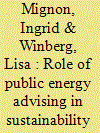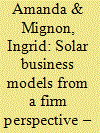|
|
|
Sort Order |
|
|
|
Items / Page
|
|
|
|
|
|
|
| Srl | Item |
| 1 |
ID:
190598


|
|
|
|
|
| Summary/Abstract |
Public energy advising is a policy measure used to provide customized energy information and advice to energy end-users. It aims at encouraging and promoting decisions leading to reduced environmental impact from energy use. While the independent function of public energy advising is unique and important, in Sweden, the role of energy advisors is changing. With new and more complex client demands as well as increasing competition from other forms of advising, there is a need to examine the shift that public energy advising is facing. The aim is to provide an overview of the activities performed by public energy advisors in Sweden and to explore the roles that they play in the transition to a sustainable energy system. Based on a qualitative analysis of 129 activity reports from Swedish municipal energy advisors, this paper shows that public energy advisors do not only play a role on an actor-level, but also on a system-level, by undertaking activities connecting the target groups to other actors in society and translating national policy to the local level. These system-level roles represent an important potential for policies aimed at accelerating the energy transition, and thus they should be encouraged and maximized.
|
|
|
|
|
|
|
|
|
|
|
|
|
|
|
|
| 2 |
ID:
186430


|
|
|
|
|
| Summary/Abstract |
A worldwide transition towards sustainable energy systems requires the diffusion of renewable electricity technologies. To achieve this, recent research has put emphasis on the role of business models as catalysts for sustainability transitions, particularly in the case of solar photovoltaics. Authors have identified a variety of solar business models that can be characterized based on roles, activities, and applications. In contrast, on the market, solar firms use business models to communicate their offer to clients, focusing on customers’ needs, how they organize their resources and activities to meet these needs and, in return, create value for themselves. The aim of this paper is to bridge the gap between the way energy policy literature describes solar business models, and the way solar firms use them to communicate with their clients. The business models of 241 solar firms in Sweden were mapped and analyzed using a framework developed by Richardson (2008) as well as the roles, activities, and applications as highlighted in solar business model literature. This led us to identify six types of solar business models. We found that there are some gaps and overlaps between theoretical and empirical solar business models which, in turn, have implications for theory and policy.
|
|
|
|
|
|
|
|
|
|
|
|
|
|
|
|
| 3 |
ID:
121313


|
|
|
|
|
| Publication |
2013.
|
| Summary/Abstract |
Transforming energy systems to fulfill the needs of a low-carbon economy requires large investments in renewable electricity production (RES-E). Recent literature underlines the need to take a closer look at the composition of the RES-E investor group in order to understand the motives and investment processes of different types of investors. However, existing energy policies generally consider RES-E investments made on a regional or national level, and target investors who evaluate their RES-E investments according to least-cost high-profit criteria. We present empirical evidence to show that RES-E investments are made by a heterogeneous group of investors, that a variety of investors exist and that their formation varies among the different types of renewable sources. This has direct implications for our understanding of the investment process in RES-E and for the study of motives and driving forces of RES-E investors. We introduce a multi-dimensional framework for analyzing differences between categories of investors, which not only considers to the standard economic dimension which is predominant in the contemporary energy literature, but also considers the entrepreneurship, innovation-adoption and institutional dimensions. The framework emphasizes the influence of four main investor-related factors on the investment process which should be studied in future research: motives, background, resources and personal characteristics.
|
|
|
|
|
|
|
|
|
|
|
|
|
|
|
|
|
|
|
|
|